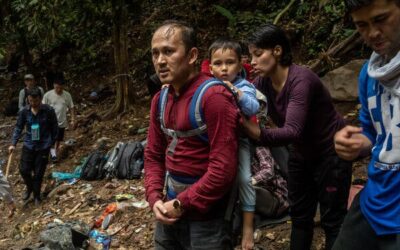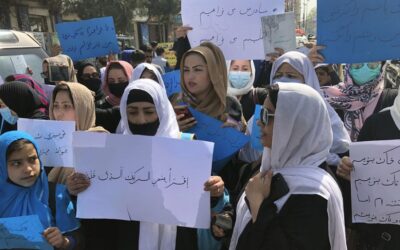KABUL — In one curtained room, half a dozen young men and women huddle on cushions, smoking hookahs and chatting. In the next, a troubadour strums a guitar and sings protest songs for a party of high school soccer players. In a cubicle between, customers take turns kneeling to say their prayers.
Welcome to Kabul’s Art Cafe and Restaurant, the latest front line in a seesawing urban culture war between a post-Taliban, Internet-savvy generation that wants to push the limits of democratic freedom and a deeply conservative Muslim establishment that is determined to preserve its traditions — especially the segregation of the sexes.
The Art Cafe is one of a cluster of hip hangouts that have opened in a busy commercial section of west Kabul in the past year, attracting a mix of students, artists, journalists and other young sophisticates. Police have kept a watchful eye for alcohol and other infractions, but until last week, there had been no serious confrontations.
Then, at 4 p.m. on Aug. 9, a squad of police burst into the cafe with guns drawn and started grabbing and shoving people. According to the co-owner and several witnesses, they shouted sexual insults at some of the women and hustled some of the men off to police headquarters, where their long hair was cut off — a punishment once meted out by the Taliban religious police.
“We asked them why they were doing this, and they said they had orders to round up the rabble around the city,” said Hassan Fazili, a partner in the cafe. “I’m an artist and a filmmaker, and we have an open atmosphere here, but we are doing nothing wrong. We do not allow alcohol or weapons. We are all Muslims. And we are definitely not rabble.”
Duniya Sadeqi, 29, an actress, said she had gone to the cafe that day to meet a friend who was making a documentary. During the raid, she said, the police punched and cursed her. “They said, ‘You are a whore, or you would not be in such places,’ ” she recounted Wednesday, dressed in a pink head scarf and long black dress. “I was very scared.”
But if the city police were trying to enforce an obsolescing moral code, their superiors at the Interior Ministry were apparently embarrassed by the incident. After complaints from civic groups, Afghan news outlets reported that some of the officers involved were arrested, and Wednesday, a delegation of ministry officials visited the cafe to work things out.
“It was all a misunderstanding,” said one official, who spoke on the condition of anonymity, as he left the premises surrounded by half a dozen police guards. Repeated efforts to reach officials and spokesmen for the Kabul police were unsuccessful.
The misunderstanding, though, runs much deeper than ham-handed police vigilantism. The collapse of the Taliban in 2001 and the advent of Western ideas, aid and technology have opened an isolated Islamic society to the modern world. The impact has been especially pronounced in the capital and other large cities, with colleges and jobs for those who learn English and computer skills.
Conflict has been inevitable, often between parents and grown children who seek to marry for love, try to date or simply want to spend time in a mixed-gender environment — all of which are strictly prohibited by Afghan social and religious codes. Muslim clerics often warn of the dangers of Western influence on the young.
“We are extremely concerned about the spread and infiltration of foreign culture in our society,” said Enayatullah Balegh, a member of the national council of Muslim clergy. “There is a big distinction between Islamic culture and others in the way we dress and interact with each other. Islam favors modern development and science but not immoral and corrupt behavior.”
In rural areas, families and tribal elders have continued to keep a tight rein on the behavior of the young, especially in conservative southern regions. In several recent high-profile cases, strong local support forhonor killings, and other punishments against girls who elope or are raped, suggests that rigid traditional mores are reasserting themselves as Western troops, civilians and influence start to withdraw.
But in large northern cities such as Kabul, Herat and Mazar-e Sharif, many young people have found sanctuaries such as the Art Cafe where they can talk, flirt and express themselves freely about politics and social change as well as love.
On Wednesday, Naser Royan, 27, held a young audience spellbound as he sang a series of original folk songs to an urgent guitar rhythm. One ballad beckoned listeners to visit the “reality” of Afghan life occurring under city bridges where opium addicts gather. Another was about a girl in Italy who was killed protesting against injustice.
In the hookah room next door, young men and women sat close and laughed with a carefree intimacy that would have shocked many older Afghans. Yet they all described themselves as observant Muslims, and most of them periodically left the room to pray.
“We come here because there is a new level of freedom. We all want change, but only within the Islamic framework,” said a 21-year-old law school student who gave her name as Attiyah and who was texting on her iPhone between puffs on a tall glass pipe.
But there is another dimension to this trend that highlights the differences between ethnic and religious groups in Afghanistan. In Kabul, places such as the Art Cafe are confined mostly to the city’s western district, a redoubt of its Shiite Muslim and ethnic Hazara minority; both Herat and Mazar-e Sharif have large Shiite populations.
The Hazaras, often regarded as inferior by other Afghans, tend to be more liberal and worldly than the Sunni-majority Tajiks and Pashtuns, in part because many were exiled and educated in Iran during Afghanistan’s years of conflict. Some of the cafe customers said they were born in Iran and came back with their families after the fall of the Taliban; many attend Shiite colleges in the city.
During a decade of Western-backed democracy, this group has been able to flex increasing political and cultural muscle, but activists worry that these gains could be lost as the protective international presence here diminishes.
“Some authorities think if democracy grows, society will escape the bound of our religion,” said Salman Dostzada, a political activist who protested against the cafe raid. “Our society has begun to liberalize in these years, but the cost is already too high.”




0 Comments